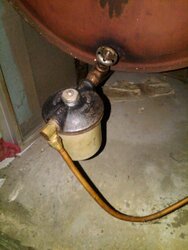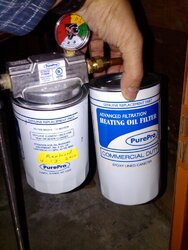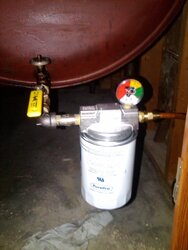Hello
Well I put the 10 Micron Filter in April 13,2010 and got almost 2 years out of it. There was some sluge in it so I just changed it. (Jan 30,2012) So I decided to change it when I put the new coated oil line in and use a 30 Micron Filter. See bare copper oil line replacement to coated vein copper line https://www.hearth.com/econtent/index.php/forums/viewthread/90016/
https://www.hearth.com/econtent/index.php/forums/viewthread/90016/
With a ball valve shutoff, it is easier to change the spin type filters and there is 25% more filtering capacity.
So which Oil Tank Filter do you prefer on your residential home heating oil tank?
Pure Pro Filters http://www.fwwebb.com/purepro/html/filters.html
http://www.fwwebb.com/purepro/html/filters.html
1. Spin type Garber Commercial 5 year - 30 Micron Filter
See pic in link
http://www.tanks.ie/products_id/363/cim-tek-hydrosorb-filter-30-micron-5-12-inch.htm
Also see commercial duty filter in middle pic below:
2. Older Westwood F80 cast iron type Oil filter changed every year
http://www.homedepot.com/webapp/wcs...talogId=10053&productId=202274784&R=202274784
3. Spin type Garber Residential 2 Year - 10 Micron Filter
http://www.patriot-supply.com/products/showitem.cfm/GAR_BER_11V_RK
Having an oil filter do iit's filtering and not go into bypass mode is impotant!
Well I put the 10 Micron Filter in April 13,2010 and got almost 2 years out of it. There was some sluge in it so I just changed it. (Jan 30,2012) So I decided to change it when I put the new coated oil line in and use a 30 Micron Filter. See bare copper oil line replacement to coated vein copper line
 https://www.hearth.com/econtent/index.php/forums/viewthread/90016/
https://www.hearth.com/econtent/index.php/forums/viewthread/90016/With a ball valve shutoff, it is easier to change the spin type filters and there is 25% more filtering capacity.
So which Oil Tank Filter do you prefer on your residential home heating oil tank?
Pure Pro Filters
 http://www.fwwebb.com/purepro/html/filters.html
http://www.fwwebb.com/purepro/html/filters.html1. Spin type Garber Commercial 5 year - 30 Micron Filter
See pic in link
http://www.tanks.ie/products_id/363/cim-tek-hydrosorb-filter-30-micron-5-12-inch.htm
Also see commercial duty filter in middle pic below:
2. Older Westwood F80 cast iron type Oil filter changed every year
http://www.homedepot.com/webapp/wcs...talogId=10053&productId=202274784&R=202274784
3. Spin type Garber Residential 2 Year - 10 Micron Filter
http://www.patriot-supply.com/products/showitem.cfm/GAR_BER_11V_RK
Having an oil filter do iit's filtering and not go into bypass mode is impotant!




